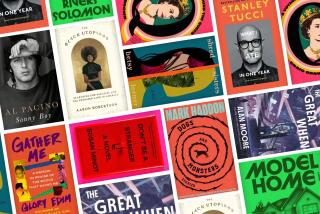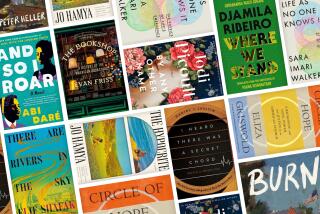Cranky in August : A fussy man overheats reading the history of ices : HARVEST OF THE COLD MONTHS: The Social History of Ice and Ices, <i> By Elizabeth David (Viking: $24.95; 379 pp.)</i>
I know it’s sort of a reviewer’s cliche to say, “I opened this book with considerable anticipation.” But that’s in fact what I actually did do with this one. And where I opened it to was page 246, where I read: “A precise account of how the drinking water was cooled at Akbar’s court is recorded in the famous Ain-i-Akbari or Institutions of Akbar , written at the Emperor’s order by Abdul Fazl Allani and completed c. 1590, and there is little doubt that the system had long been known.”
Well, I thought, I’ll try another page in a moment. My anticipation was based on solid grounds. I’d heard that Elizabeth David was an even better writer about food than the estimable M.F.K. Fisher. And James Beard, the late-lamented cooking authority and author, had written of her: “She is to me probably the greatest food writer we have.” And someone named Jane Grigson, writing in the London Times Literary Supplement, called her “the best food writer of our time.”
I don’t usually read cookbooks, and admittedly I wasn’t even hungry; but I had been a fan of good writing in my time, off and on; and I thought: The TLS usually knows what it’s talking about. So I opened the book again with renewed enthusiasm, this time to page 179, where I read: “In the light of Jarrin’s strictures and Fuller’s disregard or ignorance of the uses of the saccharometer and of the correct method of adding sweetened meringue to ices, it can be assumed that the latter’s freezing pails were superior to his ices.”
“Well,” I thought. Well, it’s August anyway and the book is about ice and ices, so keep reading so as to keep cool. But the book is more than 300 closely printed oversized pages with long passages of unedited excerpts from treatises on ice-making in ages long past, so full of detailed accounts of the unbelievable labor and time and expense and disappointments (financial and otherwise) that have gone into this odd business of preserving and making ice since the beginning of time that reading it didn’t cool me off one damn bit. It was all so exhaustive as to be exhausting.
“Well,” I thought, catching my breath and wiping my brow. Whew! “Why’s everybody so all-fired hot about how great this Elizabeth David is as a writer?” Then I took note that this book was published posthumously (she died in 1992) and thought maybe this book is more raw research than real writing. “Bless her heart, poor soul,” I thought, “maybe this book just isn’t finished the way she would have done it if she’d lived.”
So, in search of some of the 17 other books she’s written, I set off to the library to exonerate her reputation, as well as to get cool--it being well-known that in August public libraries are nearly as cold as movie houses.
Contentedly, then, I coolly spent a hot afternoon browsing through three Elizabeth David classics: “Mediterranean Food,” “French Country Cooking” and “Summer Cooking.” These were indeed pleasant books, with great-sounding recipes, the tone of their presentation perhaps compensating for the difficulty of converting the British system of weights and measures to an American kitchen. James Beard had spoken of her as a “purist and perfectionist, intolerant of mediocrity,” and the books have the charm, somehow not inconsiderable, of being wonderfully crotchety.
In her introduction to “Summer Cooking,” for instance, she writes: “In a London restaurant which claims to serve Provencal food I found Ratatouille on the menu in February. Upon inquiring how this could be when there are neither pimentos nor aubergines nor courgettes at this time of the year I was informed that it was made with cabbages and tomatoes. The fact that restaurant keepers can and do rely upon the ignorance of the customers is to blame for these absurdities.”
And in a particularly oddly enchanting book called “An Omelet and a Glass of Wine,” which is a sort of autobiography of her travels and travails as a food writer, she writes amusingly of the various annoying magazine editors she’s had to work with. It has recipes, but they are presented with some personal narrative. In the title essay, she introduces a great-sounding cheese omelet: “There was, no doubt there still is, a small restaurant in Avignon where I used to eat about twice a week, on market days, when I was living in a rickety old house in a crumbling Provencal hill-top village about 20 miles from the city of the Popes. . . .”
Reading that passage, I realized what I’d found so distressingly missing in the book currently under review: Any sense of the author’s sensibility. Sometimes it seems there’s no substitute for the self-obsession of first-person narration. Especially if you are going to write about something intrinsically dull, I believe the only way you can try to make it interesting is to write about it personally --a predilection of technique that I’ve undoubtedly revealed (not entirely inadvertently, actually, I confess to the canny reader) even in this review.
Now, granted it would be difficult for Elizabeth David to give us a first-person account of ice-making in Persia in the 5th Century. But she’s the one who chose to write about that particular subject. Just because she chose to write about it, though, doesn’t mean that any reader in control of his own destiny has to read about it.
Readers who know and love the personal writing of Elizabeth David from her previous books will miss that crotchety charm in this book. For readers who have not previously read Elizabeth David, her final book, sadly, could scarcely be a worse introduction.
More to Read
Sign up for our Book Club newsletter
Get the latest news, events and more from the Los Angeles Times Book Club, and help us get L.A. reading and talking.
You may occasionally receive promotional content from the Los Angeles Times.








